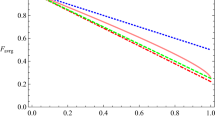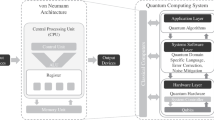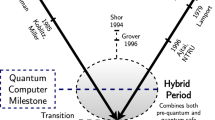Abstract
A two-party quantum private comparison (QPC) protocol is constructed with four-particle entangled states, where the third party (TP) is assumed to be semi-honest in the sense that she is allowed to misbehave on her own but cannot conspire with anyone else. The proposed protocol is secure against both the outside attack and the participant attack, and only needs single-particle measurements, neither unitary operations nor quantum entanglement swapping. Without considering the security check process, the qubit efficiency of the proposed protocol attains as high as 25%.
Similar content being viewed by others
References
Bennett, C.H., Brassard, G.: Quantum Cryptography: Public-Key Distribution and Coin Tossing. Proc. IEEE Int. Conf. Computers, Systems and Signal Processing, 175–179 (1984)
Long, G.L., Liu, X.S.: Theoretically efficient high-capacity quantum-key-distribution scheme. Phys. Rev. A. 65, 032302 (2002)
Hillery, M., Buzek, V., Berthiaume, A.: Quantum secret sharing. Phys. Rev. A. 59, 1829–1834 (1999)
Yang, Y.G., Wen, Q.Y.: An efficient two-party quantum private comparison protocol with decoy photons and two-photon entanglement. J Phys A Math Theor. 42, 055305 (2009)
Yang, Y.G., Gao, W.F., Wen, Q.Y.: Secure quantum private comparison. Phys. Scr. 80, 065002 (2009)
Tseng, H.Y., Lin, J., Hwang, T.: New quantum private comparison protocol using EPR pairs. Quantum Inf. Process. 11, 373–384 (2012)
Wang, C., Xu, G., Yang, Y.X.: Cryptanalysis and improvements for the quantum private comparison protocol using EPR pairs. Int J Quantum Inf. 11, 1350039 (2013)
Yang, Y.G., Xia, J., Jia, X., Zhang, H.: Comment on quantum private comparison protocols with a semi-honest third party. Quantum Inf. Process. 12, 877–885 (2013)
Zhang, W.W., Zhang, K.J.: Cryptanalysis and improvement of the quantum private comparison protocol with semi-honest third party. Quantum Inf. Process. 12, 1981–1990 (2013)
Chen, X.B., Xu, G., Niu, X.X., Wen, Q.Y., Yang, Y.X.: An efficient protocol for the private comparison of equal information based on the triplet entangled state and single-particle measurement. Opt. Commun. 283, 1561–1565 (2010)
Xu, G.A., Chen, X.B., Wei, Z.H., Li, M.J., Yang, Y.X.: An efficient protocol for the quantum private comparison of equality with a four-qubit cluster state. Int J Quantum Inf. 10, 1250045 (2012)
Liu, W., Wang, Y.B., Jiang, Z.T., Cao, Y.Z.: A protocol for the quantum private comparison of equality with χ-type state. Int. J. Theor. Phys. 51, 69–77 (2012)
Jia, H.Y., Wen, Q.Y., Li, Y.B., Cao, F.: Quantum private comparison using genuine four-particle entangled states. Int. J. Theor. Phys. 51(4), 1187–1194 (2012)
Liu, W., Wang, Y.B., Jiang, Z.T., Cao, Y.Z., Cui, W.: New quantum private comparison protocol using χ-type state. Int. J. Theor. Phys. 51, 1953–1960 (2012)
Pan, H.M.: Quantum private comparison based on χ-type entangled states. Int. J. Theor. Phys. 56(10), 3340–3347 (2017)
Ye, T.Y., Ji, Z.X.: Two-party quantum private comparison with five-qubit entangled states. Int. J. Theor. Phys. 56(5), 1517–1529 (2017)
Ji, Z.X., Ye, T.Y.: Quantum private comparison of equal information based on highly entangled six-qubit genuine state. Commun. Theor. Phys. 65(6), 711–715 (2016)
Lo, H.K.: Insecurity of quantum secure computations. Phys. Rev. A. 56(2), 1154–1162 (1997)
Massoud, H.D., Elham, F.: A novel and efficient multiparty quantum secret sharing scheme using entangled states. Sci China-Phys Mech Astron. 55, 1828–1831 (2012)
Li, C.Y., Zhou, H.Y., Wang, Y., Deng, F.G.: Secure quantum key distribution network with Bell states and local unitary operations. Chin. Phys. Lett. 22(5), 1049 (2005)
Li, C.Y., Li, X.H., Deng, F.G., Zhou, P., Liang, Y.J., Zhou, H.Y.: Efficient quantum cryptography network without entanglement and quantum memory. Chin. Phys. Lett. 23(11), 2896 (2006)
Shor, P.W., Preskill, J.: Simple proof of security of the BB84 quantum key distribution protocol. Phys. Rev. Lett. 85(2), 441–444 (2000)
Cai, Q.Y.: Eavesdropping on the two-way quantum communication protocols with invisible photons. Phys. Lett. A. 351(1), 23–25 (2006)
Gisin, N., Ribordy, G., Tittel, W., Zbinden, H.: Quantum cryptography. Rev. Mod. Phys. 74(1), 145 (2002)
Gao, F., Qin, S.J., Wen, Q.Y., Zhu, F.C.: A simple participant attack on the Bradler-Dusek protocol. Quantum Inf Comput. 7, 329–334 (2007)
Lin, J., Hwang, T.: An enhancement on Shi et al.’s multiparty quantum secret sharing protocol. Opt. Commun. 284(5), 1468–1471 (2011)
Chen, J.H., Lee, K.C., Hwang, T.: The enhancement of Zhou et al.’s quantum secret sharing protocol. Int J Mod Phy C. 20(10), 1531–1535 (1999)
Chong, S.K., Hwang, T.: The enhancement of three-party simultaneous quantum secure direct communication scheme with EPR pairs. Opt. Commun. 284(1), 515–518 (2011)
Author information
Authors and Affiliations
Corresponding author
Ethics declarations
Conflict of Interest
The author declares that he has no conflict of interest.
Additional information
Publisher’s Note
Springer Nature remains neutral with regard to jurisdictional claims in published maps and institutional affiliations.
Rights and permissions
About this article
Cite this article
Yin-Ju, L. Two-Party Quantum Private Comparison with Four-Particle Entangled States. Int J Theor Phys 60, 2871–2877 (2021). https://doi.org/10.1007/s10773-021-04880-3
Received:
Accepted:
Published:
Issue Date:
DOI: https://doi.org/10.1007/s10773-021-04880-3




